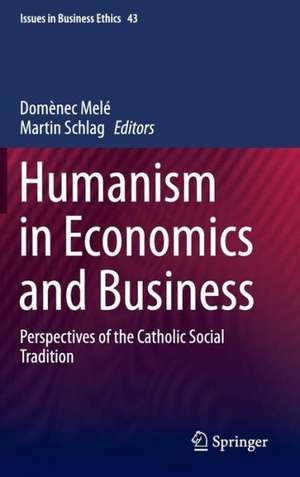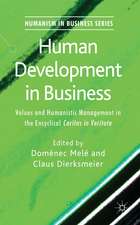Humanism in Economics and Business: Perspectives of the Catholic Social Tradition: Issues in Business Ethics, cartea 43
Editat de Domènec Melé, Martin Schlagen Limba Engleză Hardback – 23 mar 2015
| Toate formatele și edițiile | Preț | Express |
|---|---|---|
| Paperback (1) | 638.57 lei 6-8 săpt. | |
| SPRINGER NETHERLANDS – 9 oct 2016 | 638.57 lei 6-8 săpt. | |
| Hardback (1) | 644.82 lei 6-8 săpt. | |
| SPRINGER NETHERLANDS – 23 mar 2015 | 644.82 lei 6-8 săpt. |
Din seria Issues in Business Ethics
- 17%
 Preț: 364.75 lei
Preț: 364.75 lei -
 Preț: 420.97 lei
Preț: 420.97 lei - 15%
 Preț: 527.48 lei
Preț: 527.48 lei - 15%
 Preț: 644.63 lei
Preț: 644.63 lei -
 Preț: 385.84 lei
Preț: 385.84 lei - 15%
 Preț: 730.86 lei
Preț: 730.86 lei - 20%
 Preț: 517.11 lei
Preț: 517.11 lei - 15%
 Preț: 598.50 lei
Preț: 598.50 lei - 15%
 Preț: 645.60 lei
Preț: 645.60 lei - 18%
 Preț: 1220.88 lei
Preț: 1220.88 lei - 18%
 Preț: 953.03 lei
Preț: 953.03 lei - 15%
 Preț: 643.99 lei
Preț: 643.99 lei - 15%
 Preț: 644.82 lei
Preț: 644.82 lei - 15%
 Preț: 639.73 lei
Preț: 639.73 lei - 15%
 Preț: 635.96 lei
Preț: 635.96 lei - 20%
 Preț: 558.33 lei
Preț: 558.33 lei - 15%
 Preț: 640.55 lei
Preț: 640.55 lei - 15%
 Preț: 644.49 lei
Preț: 644.49 lei - 18%
 Preț: 772.93 lei
Preț: 772.93 lei - 15%
 Preț: 637.59 lei
Preț: 637.59 lei - 15%
 Preț: 643.99 lei
Preț: 643.99 lei - 15%
 Preț: 644.82 lei
Preț: 644.82 lei - 15%
 Preț: 700.61 lei
Preț: 700.61 lei - 5%
 Preț: 1098.27 lei
Preț: 1098.27 lei - 15%
 Preț: 646.43 lei
Preț: 646.43 lei - 15%
 Preț: 643.99 lei
Preț: 643.99 lei - 18%
 Preț: 952.89 lei
Preț: 952.89 lei - 15%
 Preț: 641.38 lei
Preț: 641.38 lei
Preț: 644.82 lei
Preț vechi: 758.60 lei
-15% Nou
Puncte Express: 967
Preț estimativ în valută:
123.43€ • 134.11$ • 103.74£
123.43€ • 134.11$ • 103.74£
Carte tipărită la comandă
Livrare economică 21 aprilie-05 mai
Preluare comenzi: 021 569.72.76
Specificații
ISBN-13: 9789401797030
ISBN-10: 940179703X
Pagini: 243
Ilustrații: XIV, 243 p. 2 illus., 1 illus. in color.
Dimensiuni: 155 x 235 x 20 mm
Greutate: 0.54 kg
Ediția:2015
Editura: SPRINGER NETHERLANDS
Colecția Springer
Seria Issues in Business Ethics
Locul publicării:Dordrecht, Netherlands
ISBN-10: 940179703X
Pagini: 243
Ilustrații: XIV, 243 p. 2 illus., 1 illus. in color.
Dimensiuni: 155 x 235 x 20 mm
Greutate: 0.54 kg
Ediția:2015
Editura: SPRINGER NETHERLANDS
Colecția Springer
Seria Issues in Business Ethics
Locul publicării:Dordrecht, Netherlands
Public țintă
ResearchCuprins
Foreword; Jordi Canals.- Introduction; Domenec Mele and Martin Schlag.- I Understanding Christian Humanism.- Christian Humanism within the Current Cultural Context; Luis Romera.- The Historical Development of Modern Christian Humanism; Martin Schlag .- The Christian Roots of Human Dignity and Innate Human Rights; Domenec Mele.- The contribution of Christian Humanism to development; Domenec Melé.- Renewing Western Culture through Christian Humanism; Jens Zimmermann .- News Perspectives for Christian Humanism –Rethinking the concept of liberty; Markus Krienke.- II Christian Humanism and Economic Activity.- Does Christian Humanism Make Sense within Economic Activity?; Miguel A. Martínez-Echevarría.- Social Market Economy: Seeking a Metaphysical Foundation; Peter Schallenberg.- Christian Humanism as the Ethical Basis for a Social Market Economy; Arnd Küppers.- III Christian Humanism In Business.- The Business of Business is the Human Person; Lloyd Sandelands.- The business enterprise -a Christian Humanism perspective; Michael Nauthon – Helen Alford (to be confirmed).- Italian Economia Aziendale as a Model Inspired by Christian Humanism; Ericka Costa and Tommaso Ramus.- Why is a Christian Manager Different?; Antonio Argandoña.
Textul de pe ultima copertă
This book offers different perspectives onHumanism as developed by Catholic Social Teaching, with a particular focus on its relevance in economics and business. The work is composed of three sections, covering what is meant by Christian Humanism, how it links with economic activity, and its practical relevance in the business world of today. Itreviewsthe historical development of Christian Humanism and discusses the arguments which justify it in the current cultural context and how it contributes to human development. The book argues that the current recognition of human dignity and the existence of innate human rights are both ultimately rooted in Christian Humanism. Itsets out the importance of the concept for economic activities, and how Christian Humanism can serve as a metaphysical foundation and ethical basis for a social market economy. Applying Christian Humanism to business leads to the centrality of the person in organizations and to seeing the company as a community of persons working together for the common good. Three thought-provoking case studies illustrate the wide-reaching positive impacts of applying Christian Humanism in the organization.
Caracteristici
Offers thought-provoking discussions on the beneficial contributions of Christian Humanism Makes a consistent proposal for recovering Christian Humanism in economics and business Provides a rich treasure of Christian Humanism for humanizing economics and business














